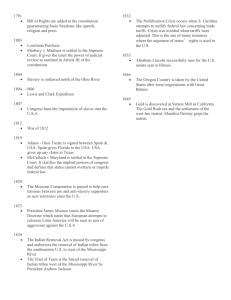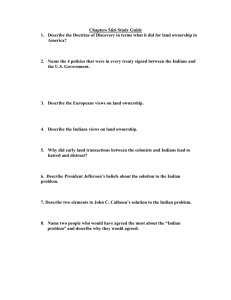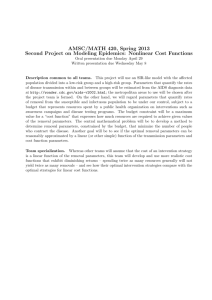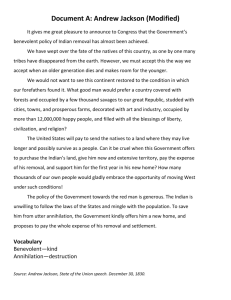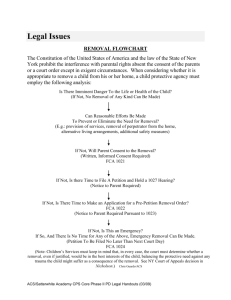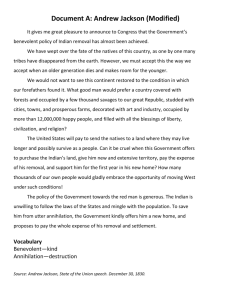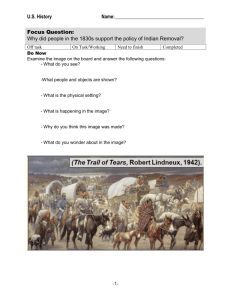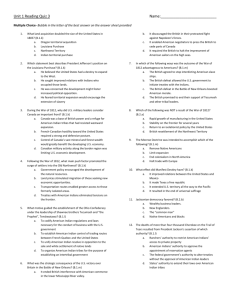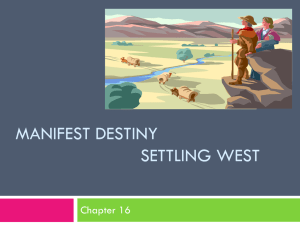Indian Removal Documents
advertisement
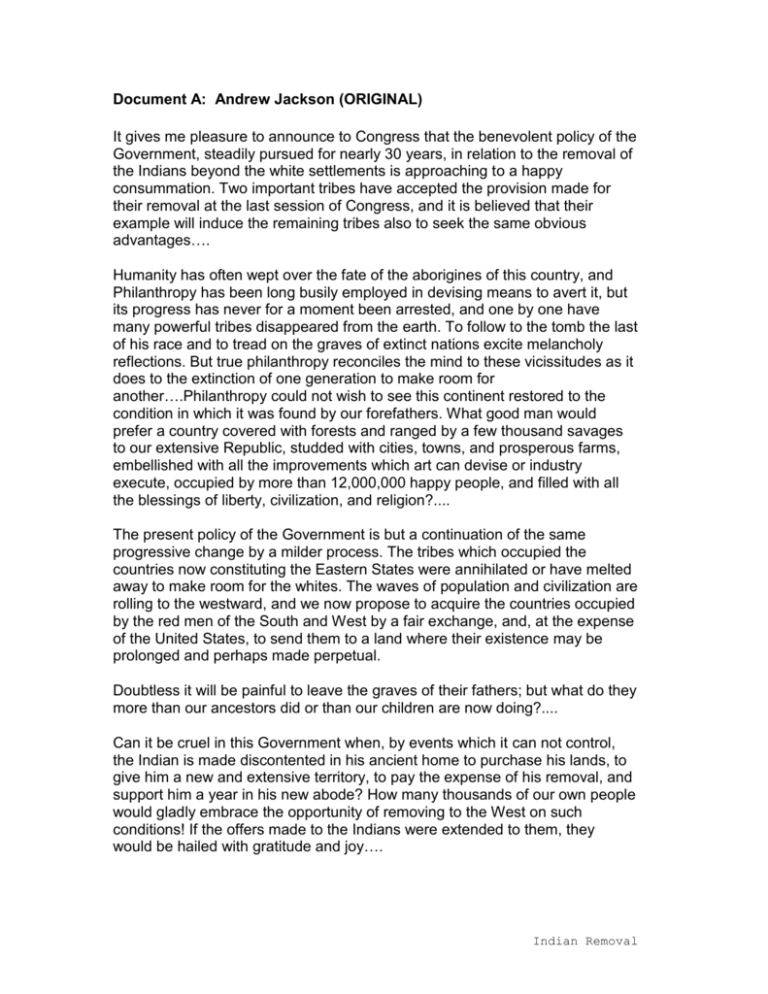
Document A: Andrew Jackson (ORIGINAL) It gives me pleasure to announce to Congress that the benevolent policy of the Government, steadily pursued for nearly 30 years, in relation to the removal of the Indians beyond the white settlements is approaching to a happy consummation. Two important tribes have accepted the provision made for their removal at the last session of Congress, and it is believed that their example will induce the remaining tribes also to seek the same obvious advantages…. Humanity has often wept over the fate of the aborigines of this country, and Philanthropy has been long busily employed in devising means to avert it, but its progress has never for a moment been arrested, and one by one have many powerful tribes disappeared from the earth. To follow to the tomb the last of his race and to tread on the graves of extinct nations excite melancholy reflections. But true philanthropy reconciles the mind to these vicissitudes as it does to the extinction of one generation to make room for another….Philanthropy could not wish to see this continent restored to the condition in which it was found by our forefathers. What good man would prefer a country covered with forests and ranged by a few thousand savages to our extensive Republic, studded with cities, towns, and prosperous farms, embellished with all the improvements which art can devise or industry execute, occupied by more than 12,000,000 happy people, and filled with all the blessings of liberty, civilization, and religion?.... The present policy of the Government is but a continuation of the same progressive change by a milder process. The tribes which occupied the countries now constituting the Eastern States were annihilated or have melted away to make room for the whites. The waves of population and civilization are rolling to the westward, and we now propose to acquire the countries occupied by the red men of the South and West by a fair exchange, and, at the expense of the United States, to send them to a land where their existence may be prolonged and perhaps made perpetual. Doubtless it will be painful to leave the graves of their fathers; but what do they more than our ancestors did or than our children are now doing?.... Can it be cruel in this Government when, by events which it can not control, the Indian is made discontented in his ancient home to purchase his lands, to give him a new and extensive territory, to pay the expense of his removal, and support him a year in his new abode? How many thousands of our own people would gladly embrace the opportunity of removing to the West on such conditions! If the offers made to the Indians were extended to them, they would be hailed with gratitude and joy…. Indian Removal Rightly considered, the policy of the General Government toward the red man is not only liberal, but generous. He is unwilling to submit to the laws of the States and mingle with their population. To save him from this alternative, or perhaps utter annihilation, the General Government kindly offers him a new home, and proposes to pay the whole expense of his removal and settlement. Source: Andrew Jackson, State of the Union speech. December 30, 1830. Indian Removal Document B: Letter by Elias Boudinot (ORIGINAL) ...I consider my countrymen, not as mere animals, and to judge of their happiness by their condition as such, which to be sure is bad enough, but as moral beings, to be affected for better or for worse, by moral circumstances, I say their condition is wretched. Look, my dear sir, around you, and see the progress that vice and immorality have already made!... If the dark picture which I have drawn here is a true one, and no candid person will say it is an exaggerated one, can we see a brighter prospect ahead? In another country, and under other circumstances, there is a better prospect. Removal, then, is the only remedy--the only practicable remedy. By it there may be finally a renovation--our people may rise from their very ashes to become prosperous and happy, and a credit to our race....I would say to my countrymen, you among the rest, fly from the moral pestilence that will finally destroy our nation. What is the prospect in reference to your [John Ross's] plan of relief, if you are understood at all to have any plan? It is dark and gloomy beyond description. Subject the Cherokees to the laws of the States in their present condition? It matters not how favorable those laws may be, instead of remedying the evil you would only rivet the chains and fasten the manacles of their servitude and degradation. The final destiny of our race, under such circumstances, is too revolting to think of. Its course must be downward, until it finally becomes extinct or is merged in another race, more ignoble and more detested. Take my word for it, it is the sure consummation, if you succeed in preventing the removal of your people. The time will come when there will be only here and there those who can be called upon to sign a protest, or to vote against a treaty for their removal--when the few remnants of our once happy and improving nation will be viewed by posterity with curious and gazing interest, as relics of a brave and noble race. Are our people destined to such a catastrophe? Are we to run the race of all our brethren who have gone before us, and of whom hardly any thing is known but their name and perhaps only here and there a solitary being, walking, "as a ghost over the ashes of his fathers," to remind a stranger that such a race once existed? May God preserve us from such a destiny. I have the honor to be, Sir, Your obedient and humble servant, E. BOUDINOT. Source: The letter above was written in 1837 by Elias Boudinot, a Cherokee who supported Indian Removal (and who signed the Treaty of New Echota that gave away Cherokee land). The letter is to Chief John Ross, leader of the Cherokees who opposed Indian Removal. Indian Removal

